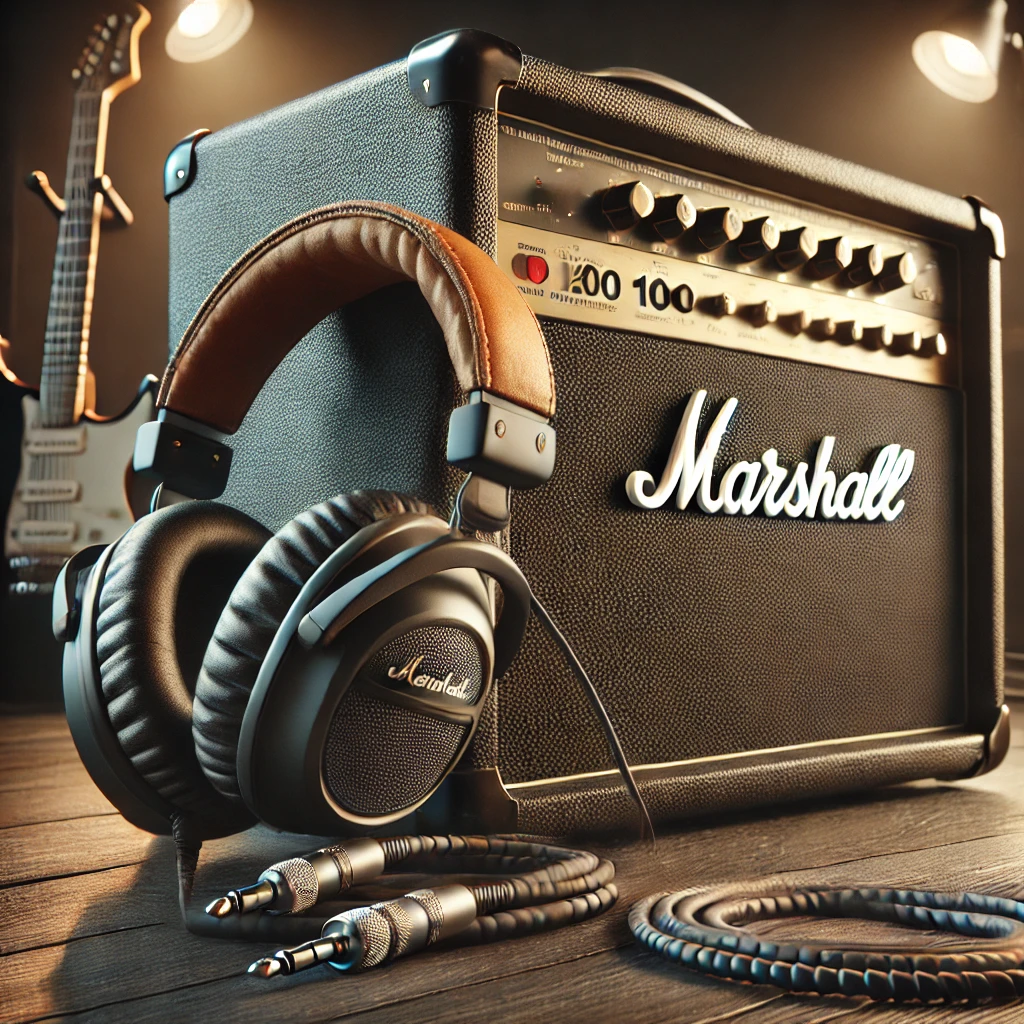Choosing the correct headphones is absolutely vital if you want to get the best sound experience from your guitar setup, particularly if you want to use them with a monster like the Marshall JCM800 2203X 100-watt guitar tube head. From classic rock fans to contemporary shredders, the JCM800 is a favorite among guitarists known for its raw, strong tone and vintage appeal. But a good quality pair of headphones that can manage the rig’s power and provide clarity, comfort, and precision is absolutely necessary to really realize its potential and hear every detail.

This post will investigate the factors that set the JCM800 2203X apart, recommend the finest headphones to go with it, and address commonly asked questions to guide your choice.
Why Pick Marshall JCM800 2203X 100-Watt Guitar Tube Head?
Renowned in the realm of rock and metal music, the Marshall JCM800 2203X 100-watt guitar tube head offers a unique British tone that has become a standard for guitarists looking for that raw, gritty edge. It produces a huge sound. The JCM800, with its all-tube design and 100 watts of power, is a go-to option for stage performances and studio recordings since it is noted for its crisp, dynamic response and strong overdrive.
Players who desire high-gain distortion, punchy midrange, and tight low-end—qualities ideal for genres like hard rock, classic rock, and metal—will find this tube head most appropriate. To maximize the Marshall JCM800 2203X, nevertheless, it’s crucial to match it with headphones that precisely mimic its sound profile, particularly when playing at loud levels or in a home studio environment.
Important Elements When Selecting JCM800 2203X Headphones
Choosing the appropriate headphones to go with a strong tube amp like the JCM800 calls for several important considerations:
Impedance Compatibility
The resistance a headphone presents to the electrical signal from your amp defines impedance. While higher impedance (e.g., 250 ohms or more) provides superior sound quality when matched with high-end audio equipment like a guitar amp, headphones with lower impedance (e.g., 32 ohms) are simpler to operate and function well with portable devices.
Sound Quality and Accuracy
From deep lows to piercing highs, the headphones should precisely reproduce the whole frequency spectrum of your guitar sound. Considering the JCM800’s reputation for rich distortion and dynamic range, you’ll want headphones that can provide these nuances free of distortion or muddiness.
Comfort
Should you intend to use the headphones for extended periods, comfort is really critical. To guarantee a decent fit during prolonged usage, go for headphones with adjustable headbands and padded ear pads.
Closed-back vs. Open-back
Closed-back headphones are perfect for isolating sound and reducing leakage, which can be beneficial in a recording setting. Conversely, while open-back headphones are less appropriate for isolation, they provide a more natural, airy sound. Decide whether you value sound isolation or a more open listening experience.
Durability
Since guitar amps, particularly tube amps like the JCM800, can push high volumes, it’s crucial to select headphones that can tolerate these levels without sacrificing sound quality.
Best Headphones for Marshall JCM800 2203X
When matching with your Marshall JCM800 2203X 100-watt guitar tube head, these are among the finest headphones to take into account:
1. Beyerdynamic DT 770 Pro (250 Ohm)
Musicians and audio engineers love the Beyerdynamic DT 770 Pro for its great sound isolation and crisp, detailed sound. These headphones are ideally suited for high-powered amps like the Marshall JCM800 with 250-ohm impedance. Their closed-back construction makes them perfect for both practicing and recording since it helps to isolate outside noise. The bass is tight, the mids are clear, and the highs are sharp without being abrasive.
- Pros: Good sound isolation, comfortable for extended use, precise sound reproduction
- Cons: More weight than comparable models; needs a strong headphone amplifier.
2. Sennheiser HD 600
The Sennheiser HD 600 is a top option if you like an open-back design for a more realistic sound. Renowned for their rich, balanced sound, these headphones provide a broad soundstage that lets you catch every nuance in your guitar tone. Although they may not provide the same degree of isolation as closed-back headphones, they offer a crisp and accurate listening experience that highlights the subtleties of the JCM800’s tonal spectrum.
- Pros: Comfortable for long use, genuine sound reproduction, broad soundstage
- Cons: Not great for loud settings, needs a premium amp for best performance.
3. Audio-Technica ATH-M50x
Many artists choose the Audio-Technica ATH-M50x because of its consistent construction and crisp, accurate sound. These headphones are flexible, providing a balanced sound profile that complements both guitar amps and other audio devices. Their closed-back construction guarantees sound isolation, so they are a good choice for practicing with your Marshall JCM800 at greater volumes.
- Pros: Excellent construction quality, great sound separation, adaptable for various genres
- Cons: Close fit on bigger heads, not as open-sounding as certain higher-end models.
4. Focal Utopia
The Focal Utopia headphones provide great sound quality for professionals that want the very finest as well as for audiophiles. Perfect for maximizing the dramatic tone of the Marshall JCM800, their open-back design provides a large soundstage and very accurate sound reproduction. Though they are very expensive, they are perfect for people who like to enjoy their guitar amp in the greatest fidelity.
- Pros: High degree of detail, broad soundstage, unrivaled sound quality
- Cons: Costly, open-back design offers less sound isolation
5. Shure SRH1540
Featuring deep bass and a crisp middle, the Shure SRH1540 is a premium closed-back headphone with a perfectly balanced sound profile. With plush ear cushions and a lightweight design, they are pleasant for long hours of use. The closed-back design keeps sound isolation, which is perfect for studio and practice settings where outside noise can be a concern.
- Pros: Good fit, deep bass, great isolation
- Cons: A bit weighty, needs appropriate amplification for best sound.
Questions Regarding Marshall JCM800 2203X Headphones
1. When selecting headphones for the JCM800 2203X, what impedance should I seek?
Headphones with greater impedance—such as 250 ohms—are perfect as the JCM800 has a strong output. When combined with this high-wattage amp, they let for best sound clarity and detail.
2. Do Marshall JCM800 work with open-back headphones?
Open-back headphones are appropriate for hearing the whole spectrum of your guitar tone since they can provide a realistic and wide soundstage. On the other hand, they offer less isolation, which could be a disadvantage in loud surroundings.
3. Using the JCM800, do I require an amplifier for my headphones?
Headphones with greater impedance, such as 250 ohms, will require a headphone amplifier to properly drive them. A headphone amp might not be required if your headphones have low impedance.
4. May I use the Marshall JCM800 with standard headphones?
Although ordinary headphones can technically work with the JCM800, especially at louder levels, they might not offer the greatest sound quality or clarity. Headphones made expressly for high-fidelity audio reproduction are advised.
5. How do open-back and closed-back headphones differ?
Closed-back headphones offer more sound isolation by means of their design, which prevents sound leaking and lowers outside noise. Conversely, while not as good at filtering outside noise, open-back headphones provide a more natural and open sound.
Final Thoughts
To really appreciate the Marshall JCM800 2203X 100-watt guitar tube head, one must match it with the correct headphones. Your choice of headphones should preserve comfort for extended playing sessions and provide clarity, accuracy, and the capacity to manage high sound pressure levels. The choices above are meant to improve your experience with this classic amplifier whether you want the detailed isolation of closed-back versions or the broad soundstage of open-back headphones. Enjoy your play!

